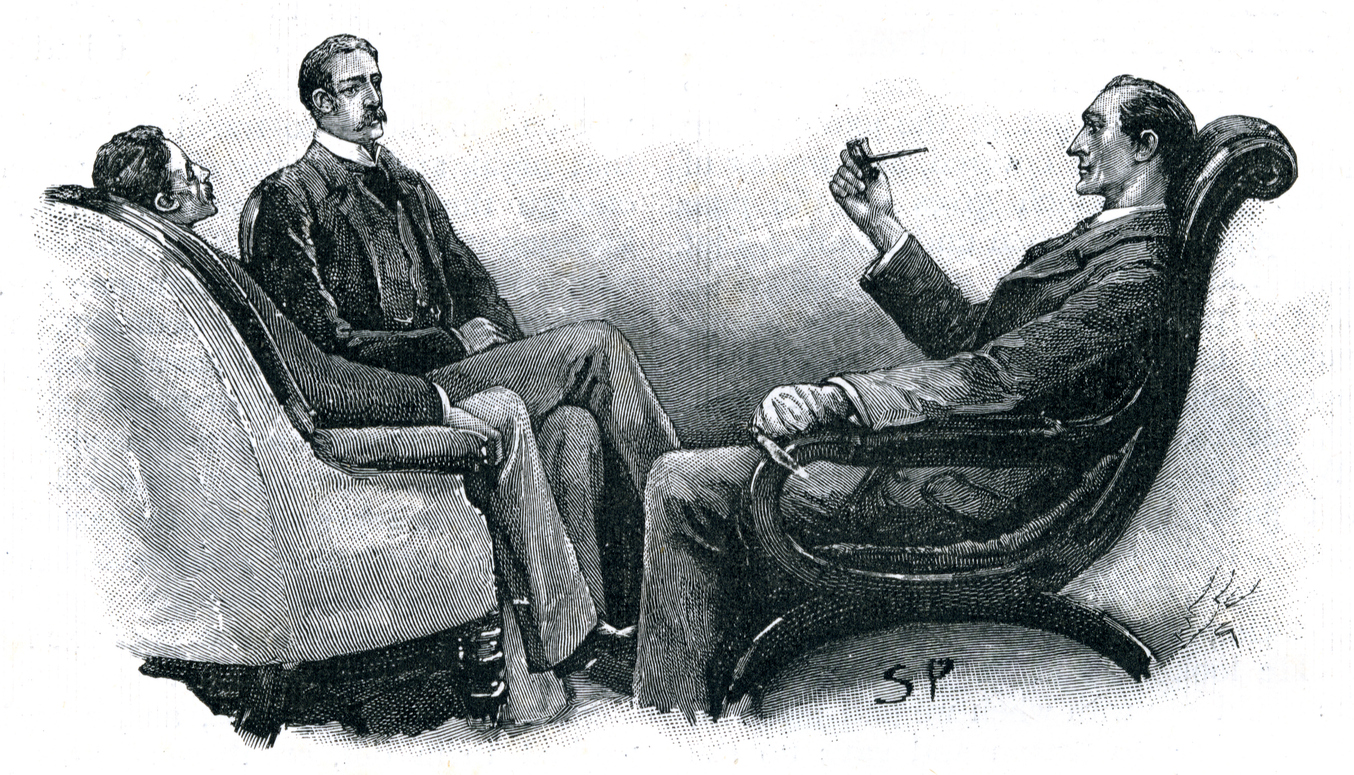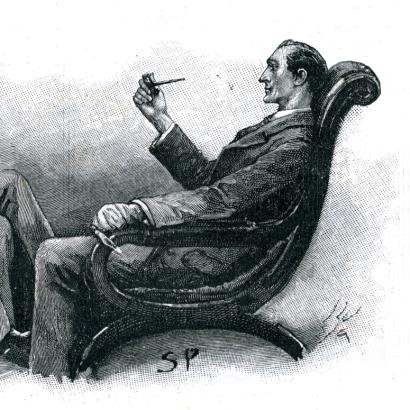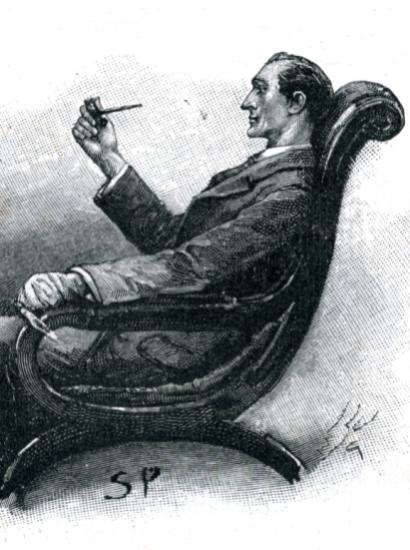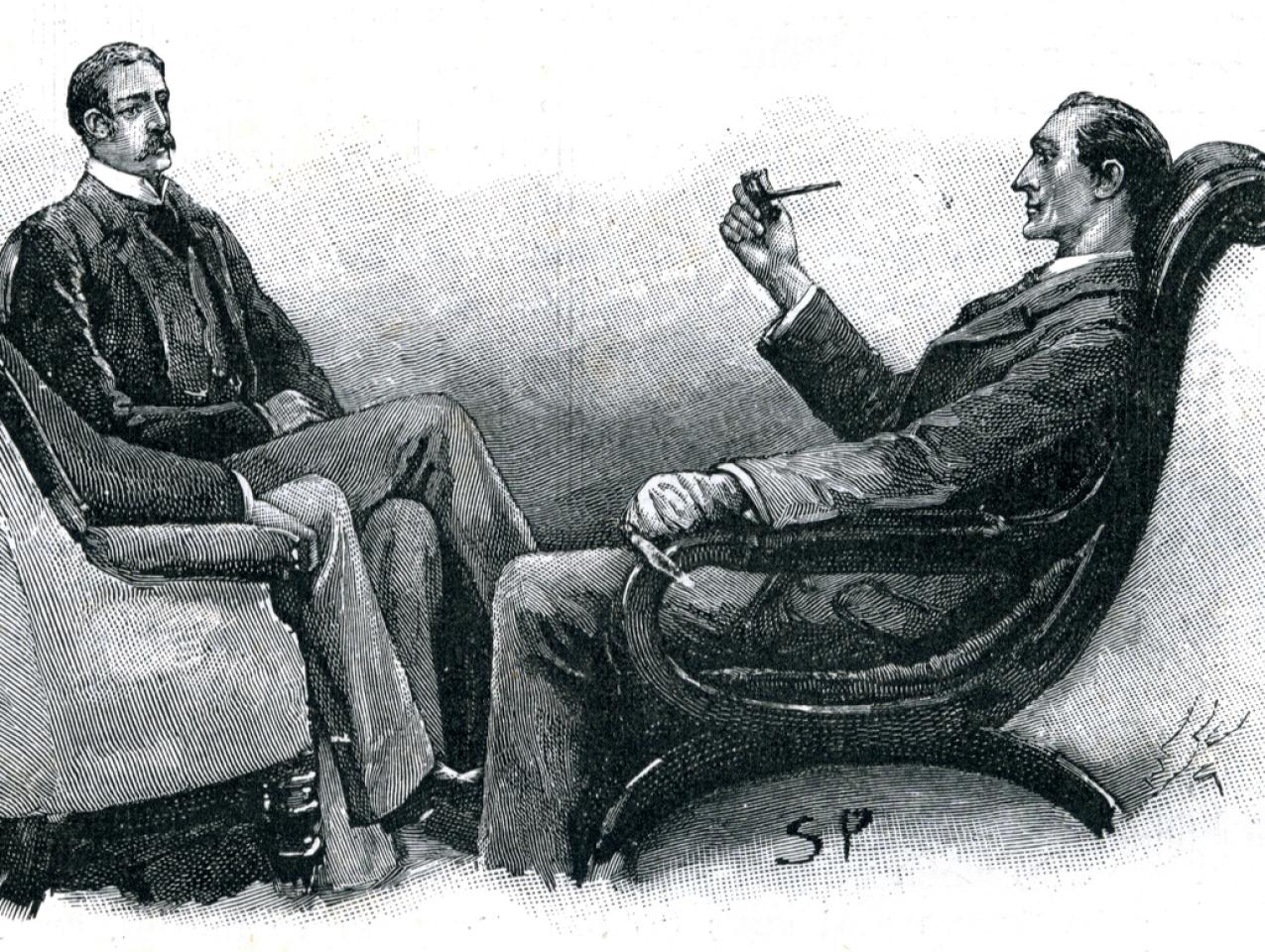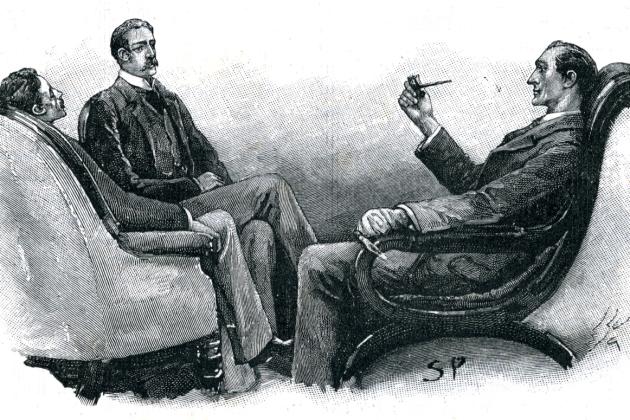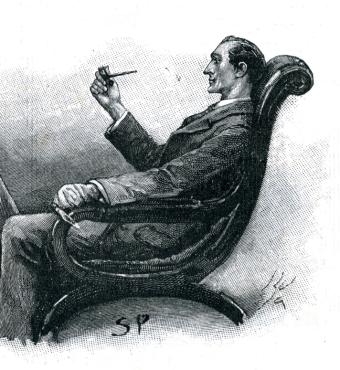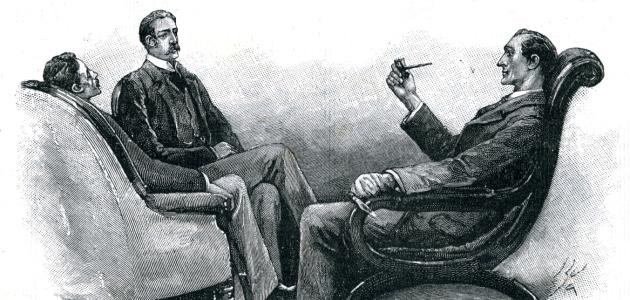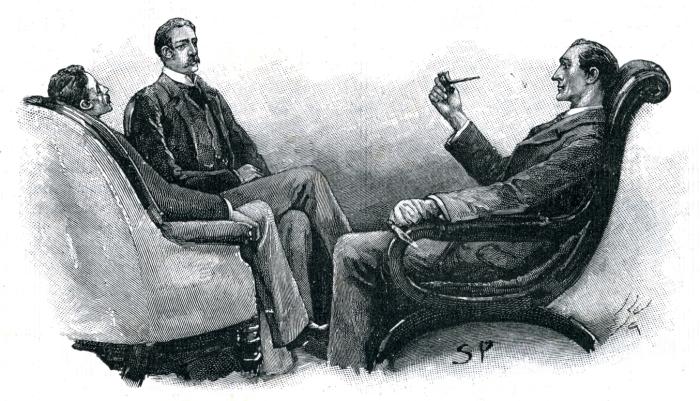As I began reading the 1,020-page history of The Economist magazine by Ruth Dudley Edwards (The Pursuit of Reason, 1993), I had no idea I would be mining a rich vein of Sherlockiana. But to my surprise, the book helps us understand the political economy context of the Canon.
Rest assured that I would not dream of inflicting on readers an “endless raving upon politics” (“The Red Circle”). A full discussion of the political, economic, and partisan views of Arthur Conan Doyle, and their expression in the Canon, must wait for another day. This essay will discuss how the Edwards book enlightens readers who have noticed the occasional Canonical references to free trade and liberalism (in the classic, not contemporary, sense) and would like to understand them better. Page numbers cited here are from the book.
Scottish businessman James Wilson founded The Economist, or The Political, Commercial, Agricultural, and Free-Trade Journal in 1843. It was dedicated to free trade and laissez faire, combining a “persuasive—even rumbustious—writing style with a near fanatical devotion to facts” (p. 1). Edwards notes that it was influential from the start due to its clear purpose and the unique voice of its founder. Almost two centuries later, it continues to shape economics and politics across the globe through its distinct classical liberal perspective.
Who Benefits from Free Trade?
For Sherlockians and Doyleans, the Edwards book almost immediately provides food for thought. Not 10 pages have passed before we learn how James Wilson’s free trade ideas closely parallel those in the Times article read by Holmes in Chapter IV of The Hound of the Baskervilles:
“Capital article this on free trade. Permit me to give you an extract from it. ‘You may be cajoled into imagining that your own special trade or your own industry will be encouraged by a protective tariff, but it stands to reason that such legislation must in the long run keep away wealth from the country, diminish the value of our imports, and lower the general conditions of life in this island.’ What do you think of that, Watson?” cried Holmes in high glee, rubbing his hands together with satisfaction. “Don’t you think that is an admirable sentiment?”
Wilson made a similar argument against agricultural tariffs. As Edwards discusses, Wilson knew he had to make the case against protectionism to those who thought they were its beneficiaries, particularly the landed classes. And such arguments needed to be practical and pointed, not theoretical or general.
According to Edwards, Wilson “had seen much earlier than most that, since the vast majority of parliamentarians were landowners, they would have to be persuaded to abandon one of their firm beliefs and to recognize that the Corn Laws were quite as inimical to agricultural as to manufacturing interests—an uncommon view” (p. 7). These tariffs on wheat and other grains were immensely controversial, as they were criticized for raising food prices, harming industry, and advantaging the landed classes at the expense of almost everyone else. Edwards notes that Richard Cobden, MP and leading free trade campaigner, admitted that he “never made any progress with the Corn Law question while it was stated as a question of class against class” (p. 9).
Wilson therefore played an important role in re-framing the free trade question so as to “get through to the lawmakers that repealing the Corn Laws was in the interest of the whole nation” (p. 8). This is exactly the point of the Times article endorsed by Holmes.
Because the Hound of the Baskervilles is so engrossing, it is easy to forget that nothing about the plot required ACD to create this particular piece of journalism. The words in the message “As you value your life or your reason keep away from the moor” could have been clipped from an infinite number of invented articles, but ACD wrote a pro-free trade editorial that eloquently expressed an essential point in the debate. This not only suggests ACD’s own views but also indicates that the Sherlockian universe is shaped by the classical liberal values advanced by Wilson and his magazine.
Newspapers
In The Hound of the Baskervilles, Holmes confessed that “once when I was very young I confused [the typeface of] the Leeds Mercury with the Western Morning News.” This gratuitous mention of two provincial newspapers makes more sense when we understand how they played important roles in the political economy debates of the era.
Edwards discusses how the Leeds Mercury contributed to the 19th century struggle for free trade and classical liberalism. It supported ideas that would become known as the Manchester School, a term “contemptuously” (p. 7) invented in 1846 by Benjamin Disraeli, a future leader of the Conservative Party. According to Oxford Reference, the movement was:
A group of economists, businessmen, and politicians who became influential in Britain in the 1840s. Based in Manchester, the centre of the cotton industry, and led by such men as John Bright and Richard Cobden, the group followed the laissez-faire philosophy of Adam Smith and David Ricardo. They supported free trade and political and economic freedom, and opposed any interference by the state in industry and commerce.
The paper’s views reflected those of its editor, “the liberal-minded MP Edward Baines” (p. 9). The Leeds Mercury also helped to promote the career of James Wilson and his uncompromising voice for free trade during the Corn Laws debate. In 1839, the paper published in installments Wilson’s 130-page (!) pro-free trade pamphlet “Influences on the Corn Laws, as affecting all classes of the community, and particularly the landed interest” (pp. 8-9).
Because of such publicity, “Within a few months, Wilson was a public figure… and his pamphlet even quoted in the House of Commons by Sir Robert Peel” (p. 10). The following year, Wilson was elected to the Reform Club, the nerve center of the Liberal Party and liberalism, which I argued in a 2017 Baker Street Journal essay was the real-life Diogenes Club. Arthur Conan Doyle would later become a member.
The Economist would also benefit from attention by “the provincial press, particularly the Leeds Mercury” (p. 25). While the magazine was independent of any party or organization, Edwards quotes an historian who observed that the magazine and the Leeds Mercury were “in a sense outriders for the Manchester School” (p. 24).
While the Western Morning News is not mentioned in the Edwards book, its co-founder was William Saunders, a Liberal Party MP. Furthermore, the paper in that era is described by the Encyclopedia of Plymouth History as politically independent but with liberal sympathies.
In sum, ACD’s choice of these two newspapers when he wanted examples of the press suggests his sympathies with liberalism as well as his knowledge of Victorian era political economy debates.
Henry Warburton
Next, we encounter a real-life Warburton, although not a mad colonel. Edwards notes that Henry Warburton was an “MP, free-trader, philosophical radical and prominent member of the Reform Club” (p. 33). She describes his efforts to raise money for The Economist to keep it afloat at a crucial time, and he personally contributed £145 (p. 34), which according to an online currency converter would be over $23,000 today. Wikipedia describes Warburton as opposed to the Corn Laws and the newspaper tax, as well as an advocate of the penny post. In other words, he was a strong supporter of liberalism.
While it is possible that the words “Colonel Warburton’s madness” (“The Engineer’s Thumb”) were an oblique commentary on his economic and political views, this seems unlikely given ACD’s generally liberal orientation. This was also not a humorous, insider reference among friends, as Warburton died the year before Conan Doyle was born.
Was Holmes an Economist?
We also learn how Sherlock Holmes might be considered an “economist.” Contrary to today’s more limited understanding of the word, Edwards observes that “in James Wilson’s world it applied to anyone who approached problems by putting every argument and doctrine to the test of the facts” (p. 17).
As this suggests, it is not only facts that matter but also how they advance debates. While The Economist did publish much economic data, Edwards noted that Wilson’s “aim was to use facts, interpreted lucidly and rationally” (p. 8) to reach lawmakers. As the word “fact” appears 471 times in the Canon and “reason” 341 times, Holmes has a strong claim to the title, contrary to Athelney Jones’s identification of him as “Mr. Sherlock Holmes, the theorist” (The Sign of the Four).
Economists did not always enjoy a positive reputation, however. As we read in Edmund Burke’s discussion of the death of Marie Antoinette in Reflections on the Revolution in France (1790):
I thought ten thousand swords must have leaped from their scabbards to avenge even a look that threatened her with insult. But the age of chivalry is gone. That of sophisters, economists, and calculators has succeeded; and the glory of Europe is extinguished forever.
We read a related criticism of Holmes in The Sign of the Four:
“You really are an automaton—a calculating machine,” I cried. “There is something positively inhuman in you at times.”
He smiled gently. “It is of the first importance,” he cried, “not to allow your judgment to be biased by personal qualities. A client is to me a mere unit, a factor in a problem. The emotional qualities are antagonistic to clear reasoning.”
James Wilson could not have put it better.
So, when Holmes seeks data and applies reason to criminal cases and other mysteries, he is not just solving problems; he is also advancing the classical liberal worldview. Holmes and Wilson are working together as economists, albeit in different venues and times, in order to rationalize and reform the world around them.
“there could be no doubt of the relationship”
The connection between Holmes and The Economist continues well into the present. Entering “Sherlock Holmes” in the magazine’s search engine reveals many and diverse references.
For example, a story at the beginning of the pandemic (“Solitude has always been both a blessing and a curse,” April 20, 2020) inaccurately notes that “Arthur Conan Doyle’s Sherlock Holmes preferred an opium pipe to ignite his solitary reveries.” On November 8, 2021, the story “Coal is being phased out—in British homes, at least” includes the following reference: “Sherlock Holmes, in his favourite armchair at 221b Baker Street, would sit ‘moodily at one side of the fireplace cross-indexing his records of crime’, reaching at times into the coal-scuttle where he kept his cigars, while the shifting of coals tracked the transmutation of one puzzle into another.”
“The name is familiar to me”
If the name Ruth Dudley Edwards rings a bell, her brother is the historian Owen Dudley Edwards, author of The Quest for Sherlock Holmes and series editor of The Oxford Sherlock Holmes. Their father was the historian Robert Dudley Edwards, who wrote a book about Daniel O’Connell, the Irish Catholic political leader, liberal, and founding member of the Reform Club.
“Art in the blood,” even that of the Liberal Arts, “is liable to take the strangest forms.”
Sources
T.S. Ashton, “The Origin of ‘The Manchester School,’” The Manchester School, 1930, Vol. 1, No. 2, pp. 22-27.
Marjie Bloy, 2022, “The Corn Laws,” The Victorian Web. https://victorianweb.org/history/cornlaws1.html
Owen Dudley Edwards, The Quest for Sherlock Holmes: A Biographical Study of Arthur Conan Doyle, Mountrath, Ireland: Dolmen, 1983.
Owen Dudley Edwards, ed., The Oxford Sherlock Holmes, Oxford: Oxford University Press, 1993.
Robert Dudley Edwards, Daniel O’Connell and His World, London: Thames and Hudson, 1973.
Ruth Dudley Edwards, The Pursuit of Reason: The Economist 1843-1993, London: Hamish Hamilton, 1993.
Encyclopaedia of Plymouth History. Updated: May 23, 2011. “Newspapers: Western Morning News.” http://www.plymouthdata.info/Newspapers-WMN.htm
David L. Leal, “What Was the Diogenes Club?” Baker Street Journal, Vol. 67, No. 2 (Summer 2017), pp. 16-26.
Eric W. Nye, “Pounds Sterling to Dollars: Historical Conversion of Currency,” accessed January 27, 2024. https://www.uwyo.edu/numimage/currency.htm
Oxford Reference, “Overview: Manchester School,” Oxford University Press. https://www.oxfordreference.com/display/10.1093/oi/authority.20110803100129999







